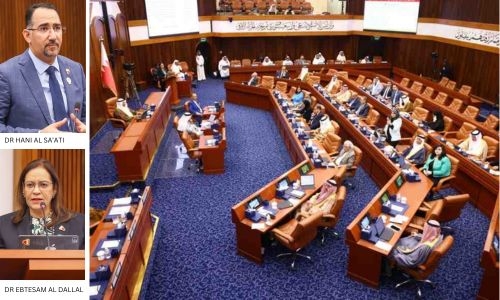Shura Council approves law capping late health licence renewal fines at 25%
TDT | Manama
Email: mail@newsobahrain.com
Fines for late licence renewals are on course to be capped at 25 per cent under a law passed by the Shura Council yesterday, replacing the current double-penalty system. The law also allows Bahrainis in fields such as laboratory sciences to open clinics, a privilege previously limited to medical doctors. The changes aim to give more Bahrainis the opportunity to contribute to the health sector while easing financial pressures on professionals.
Under the new system, fines for late renewals will be applied gradually, starting at 25 percent, rather than leaping to double the renewal fee at once. The proposal was spearheaded by Dr Ebtesam Al Dallal, Jamal Fakhro, Dr Jehad Al Fadhel, Dalal Al Zayed, and Dr Jameela Salman.
Approach
Dr Ahmed Al Orayed praised Bahrain’s forward-thinking approach to healthcare, recalling reforms in the 1990s that allowed doctors to establish clinics outside Salmaniya Medical Complex. He noted how the late Prime Minister supported these efforts with affordable electricity and water rates. However, Al Orayed criticised the current system of fines and charges, warning that higher costs would inevitably burden patients. He urged the government to ease restrictions on clinics rather than adding financial strain.
Reform
Dr Al Dallal stressed the urgency of reform, pointing to the closure of three major hospitals in 2024 as a stark reminder of the need for investment and rare specialisations.“This law focuses on rare specialisations identified by the National Health Regulatory Authority, ensuring hospitals remain viable and attract critical investment,” she said. Non-Bahrainis will also be permitted to establish clinics in rare fields under the amended Article 5, provided their expertise is licensed.
Notice
Additionally, Article 28 requires health institutions to be given three months’ notice before penalties are applied for missing renewal deadlines.
Dr Hani Al Sa’ati echoed concerns about Bahraini clinics struggling under pressure from foreign-owned businesses, stating, “Over 40 health institutions have shut down in the past two years because of unfair competition.” He questioned why private hospitals rely on foreign general practitioners when qualified Bahrainis are available.
Improvements
Al Sa’ati also called for improvements in medical training, highlighting that some universities fail to provide the necessary internship year, forcing families to send students abroad to complete their education. The National Health Regulatory Authority, the Ministry of Health, and the Supreme Council of Health backed the proposed law but cautioned that limiting licences to Bahrainis in some areas could have economic consequences. They called for further review to balance local benefits with broader implications for the health sector.
Related Posts

